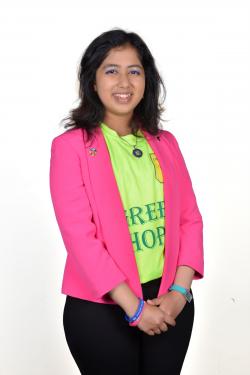
Toronto, CanadaAge: 18
Tell us a bit about yourself!
I am the Founder and President of the youth sustainability organization, Green Hope Foundation, through which I work to educate and empower children and youth globally. We engage youth in the Sustainable Development Goals (SDG) process through ground-level, community-centric projects on climate justice, halting land degradation, promoting sustainable consumption and renewable energy, and biodiversity conservation, as well as gender equality and social justice. Green Hope now has over 1000 members across Canada, Suriname, the Middle East, India, and Nepal, and has engaged thousands of young people and adults through workshops and conferences around the implementation of the SDGs.
I am also the winner of the 2016 International Children’s Peace Prize, and at the age of 12 I was elected as the United Nations Environment Programme’s (UNEP) Global Coordinator for Children & Youth, making me the youngest person and the first ever minor in history to be elected for this position. A passionate advocate of children’s rights, I am also a United Nations Human Rights Champion and actively support the UN’s #StandUp4HumanRights campaign. In my role as the voice for children and youth, I have spoken at over 75 United Nations and other international summits across over twenty countries. Additionally, I was appointed as the Youth Ambassador of World Future Council, Honorary Advisor for the NGO Committee on Sustainable Development in New York, a Climate Reality Leader, and member of the Global Advisory Council for Young Men 4 Gender Equality, Earth Echo International Youth Leadership Council, KidsRights Youngsters, and World Oceans Day Youth Advisory Council.
What inspired you to become a champion for the environment and environmental education?
I was born on World Environment Day (5th June), and thus I feel it was pre-ordained that I should grow up to be an eco-warrior. When I was very young, I saw the image of a dead bird on TV with its stomach full of plastic. I was deeply moved by this and decided to do something about it. I began by planting a tree on my 8th birthday, went around my neighborhood urging shops and businesses to recycle and avoid using plastic, and organized tree planting events and community recycling campaigns. As a result I was chosen to attend the 2011 TUNZA International Children and Youth Conference in Bandung, Indonesia, where I spoke to thousands of youth from across the world about the role of youth in making difference in environmental conservation. This was my first step into the international arena. The following year, at age 12, I attended the Rio+20 Earth Summit as the youngest delegate to address a press conference on the World Day to Combat Desertification. On my return from Rio+20, I established Green Hope with some friends to provide young people with a platform to take action.
I have not looked back since. Today, Green Hope has over 1000 youth members, some as young as 6 years old, who are taking ground-level action across the world.
What advice would you give to the next generation of leaders that are looking to bring about positive change in their communities through EE?
My advice to the next generation of leaders is to have self-conviction and follow your passion. Change begins with one person, and my story thus far is a testament to that.
I firmly believe that every young person has the potential to be a change-maker. All we need is an opportunity. When I founded Green Hope with some friends in 2012, I never imagined that in a few years it would be a global organization, empowering children and youth in many countries. I have always followed my passion and have not been deterred by challenges and cynicism. I have been a victim of cyberbullying, stalked, and even had threats of physical violence, but with the support of my parents I have faced these challenges and come out stronger.
If you had to live in one place for the rest of your life, where would it be?
The Amazon rainforest. I recently had the opportunity to lead a Green Hope team to Suriname, invited the cabinet of the President of Suriname. Suriname is the world’s most forested country, with 93% forest cover, and during our two-week project I experienced first-hand the amazing natural beauty of the Amazon and its rich biodiversity. This country is a great example of people living in harmony with nature, and a vindication that it is possible to achieve economic development while preserving the environment.
What pro-environmental behavior do you think would make a big impact if everyone in the world started doing it?
I am a strong advocate of planting trees. Along with my Green Hope team, I have planted over 15,000 trees across the world. Trees have a direct impact on the environment and help offset our carbon footprint. At all of our workshops and conferences, I urge participants to plant trees to create a positive impact. If every person on this planet started planting trees, we would effectively combat global warming and reach a zero-carbon state.